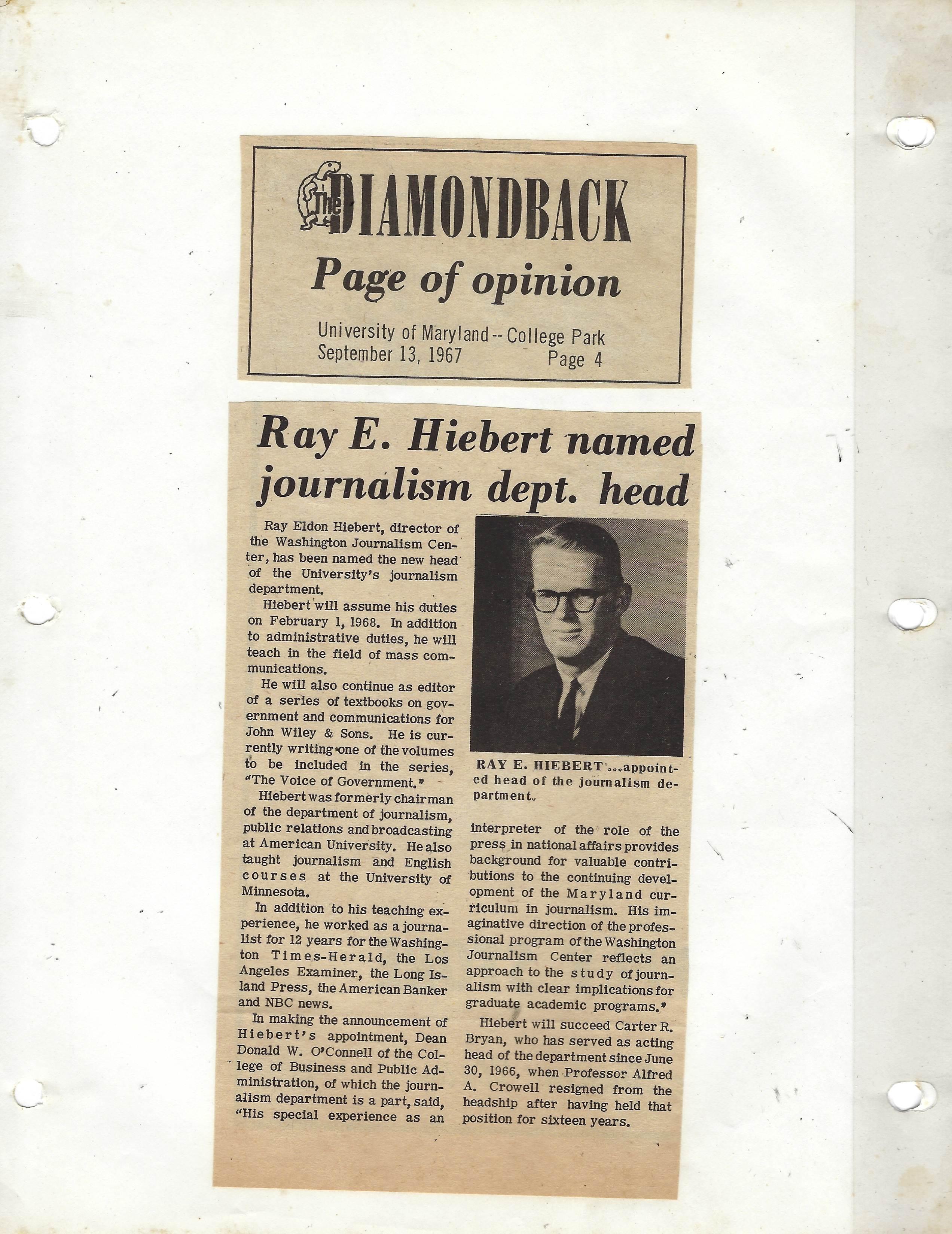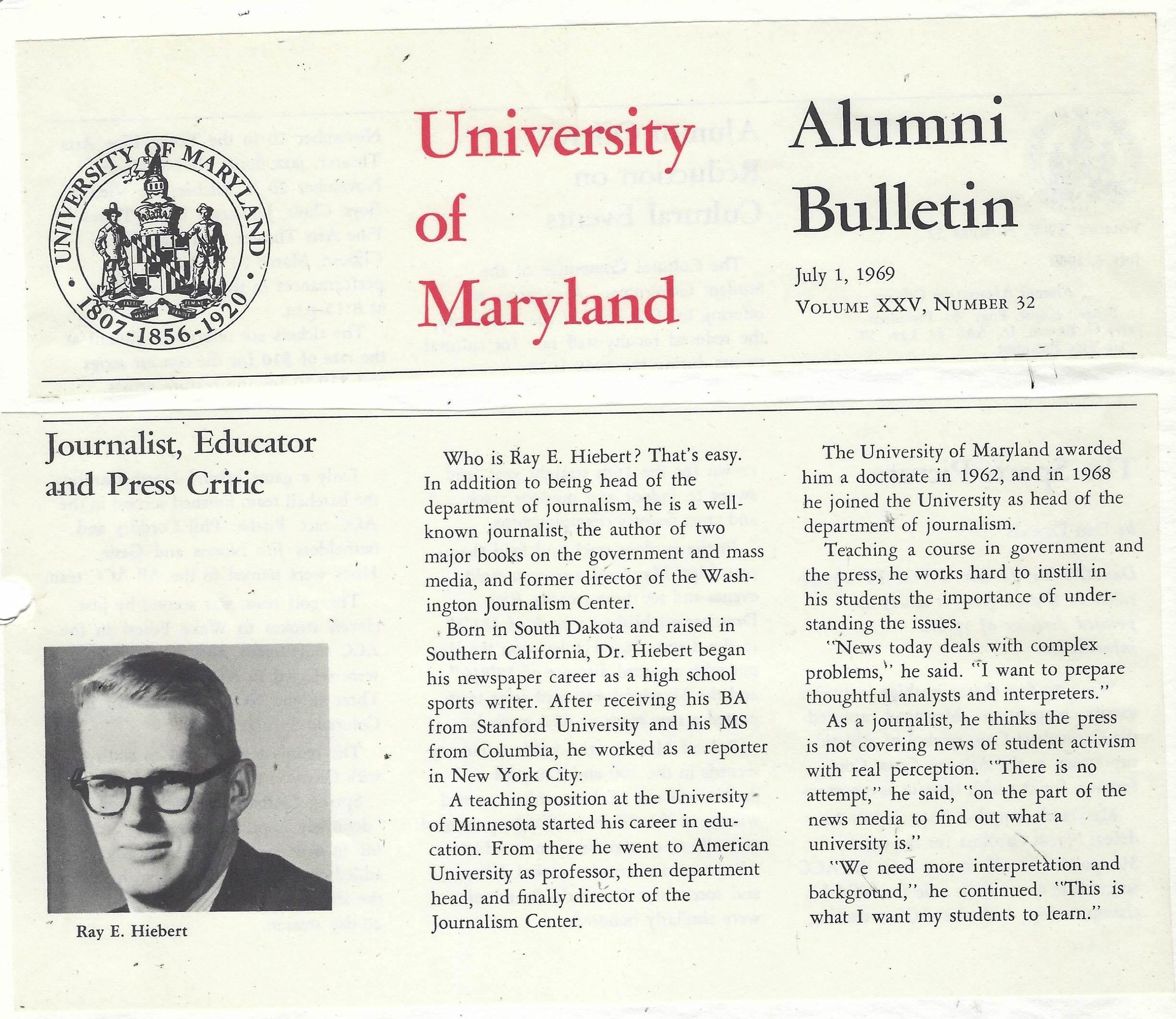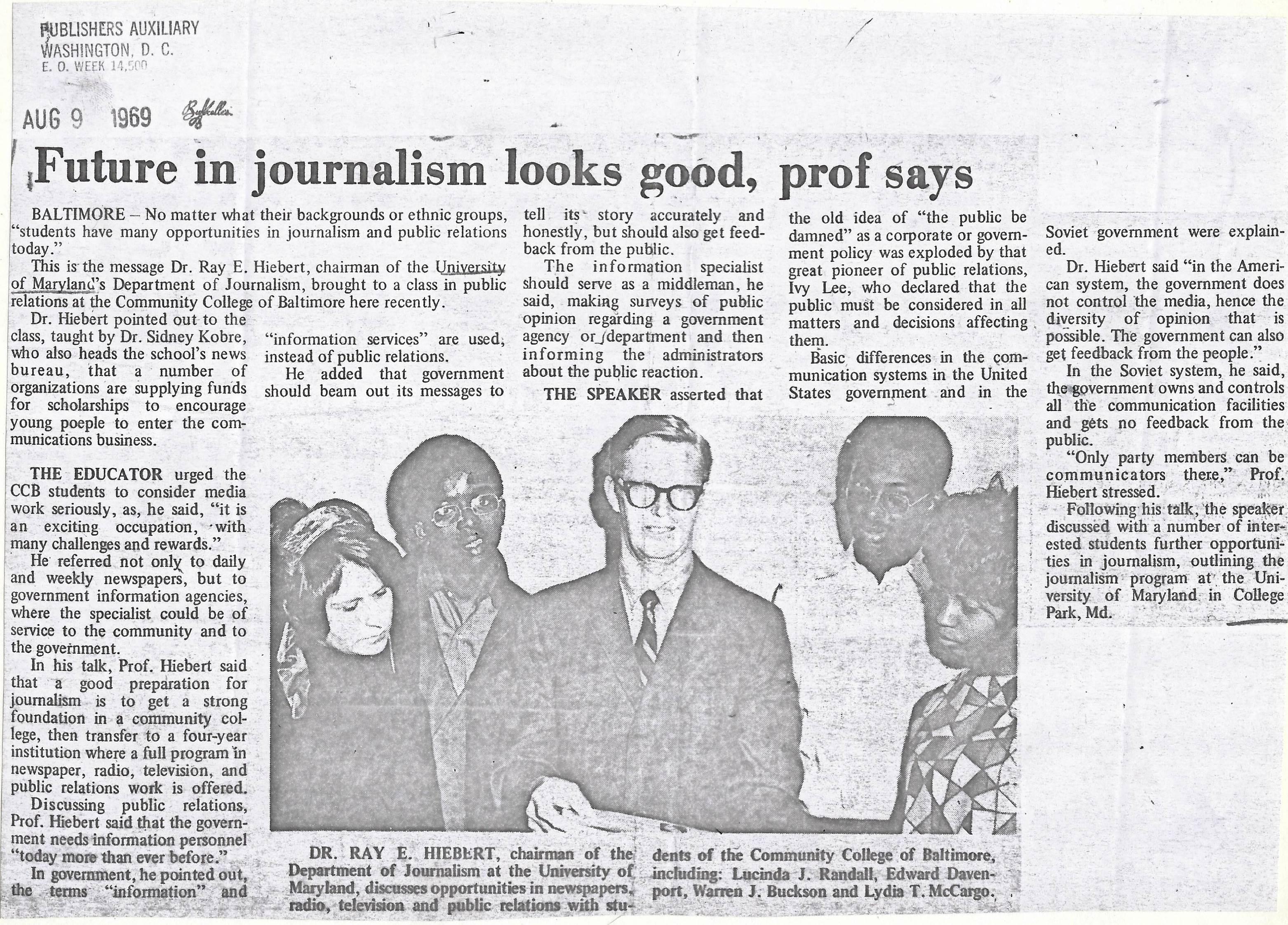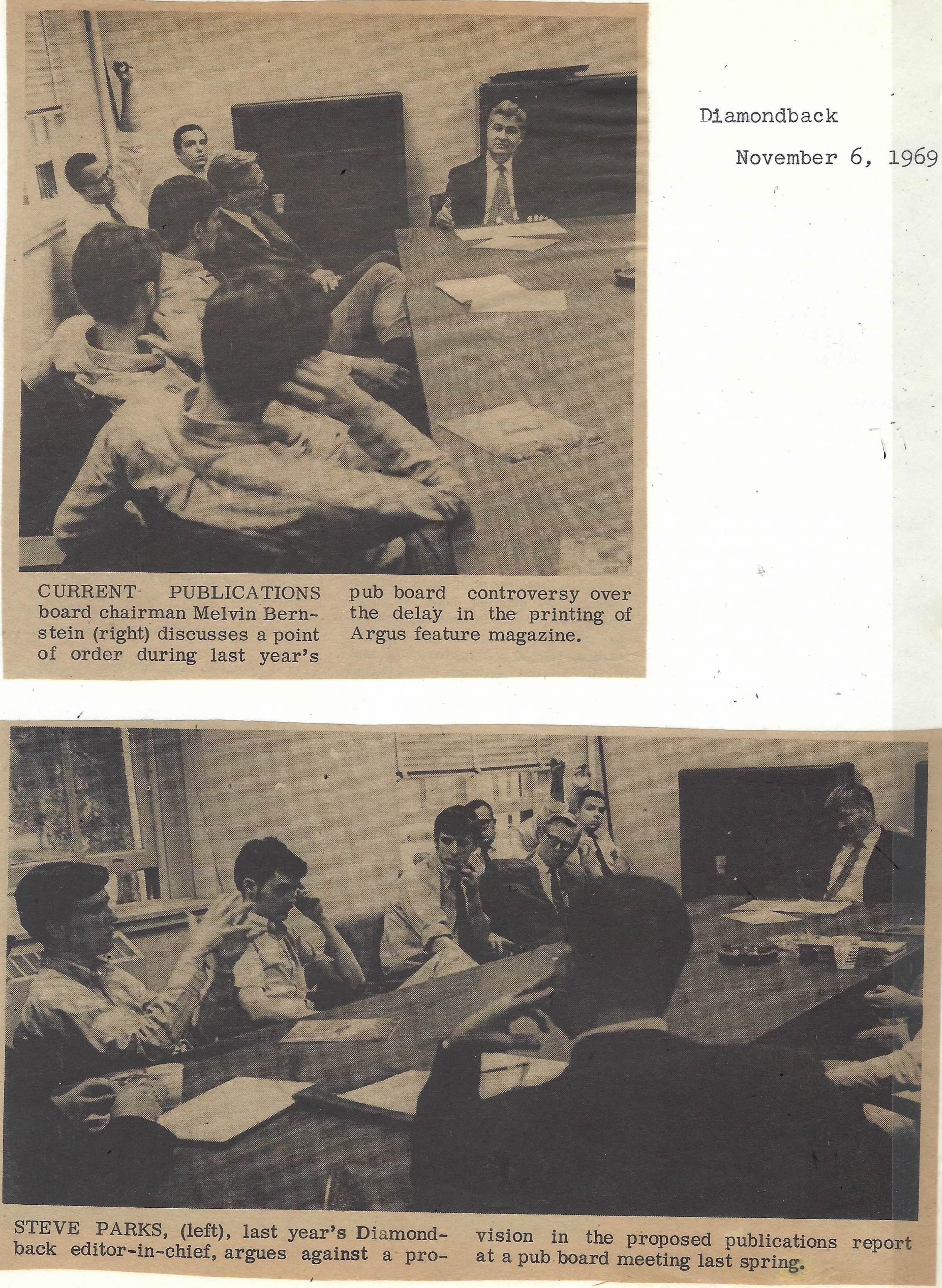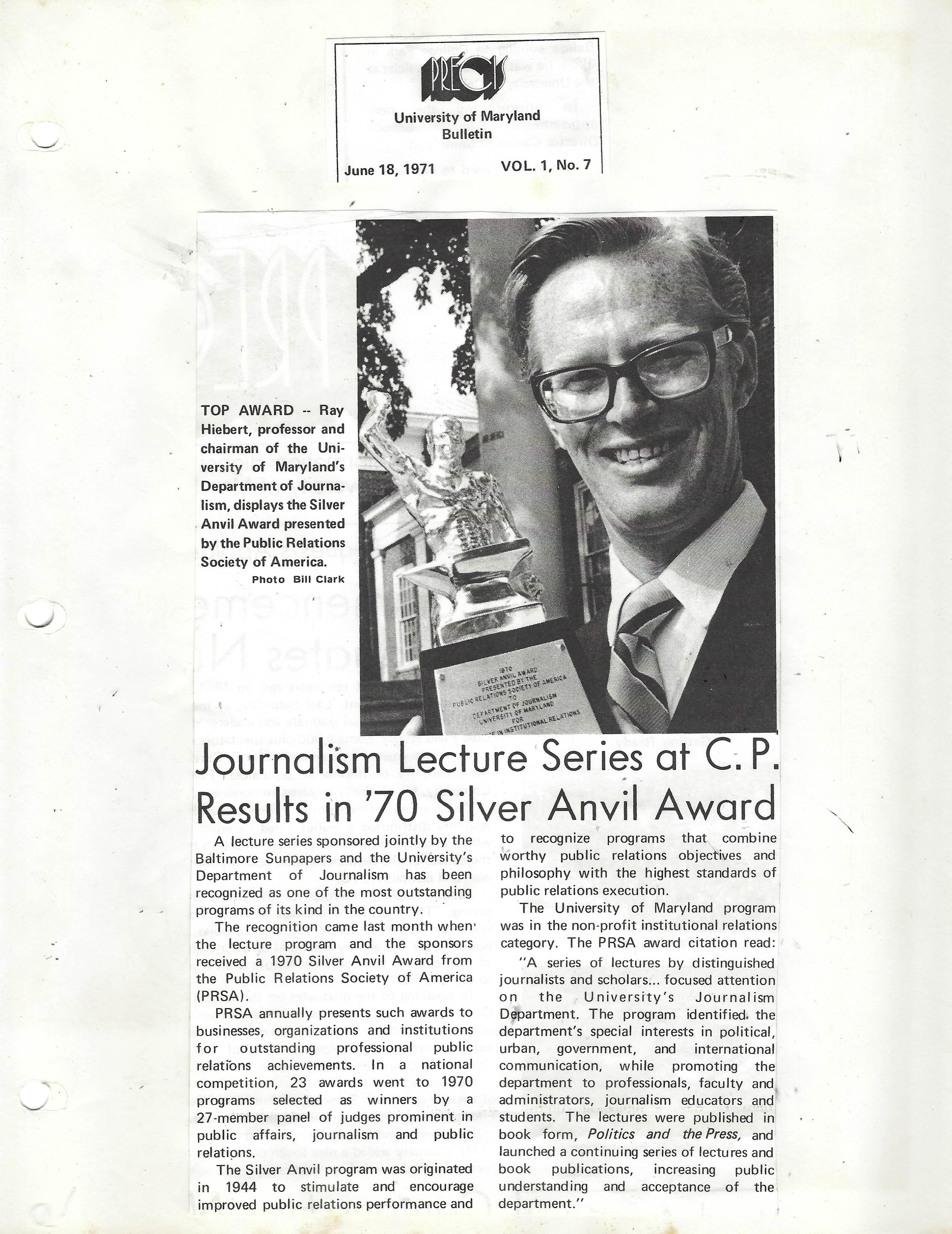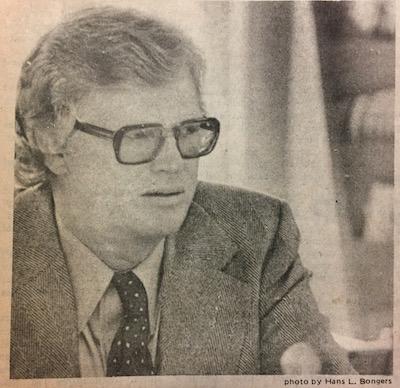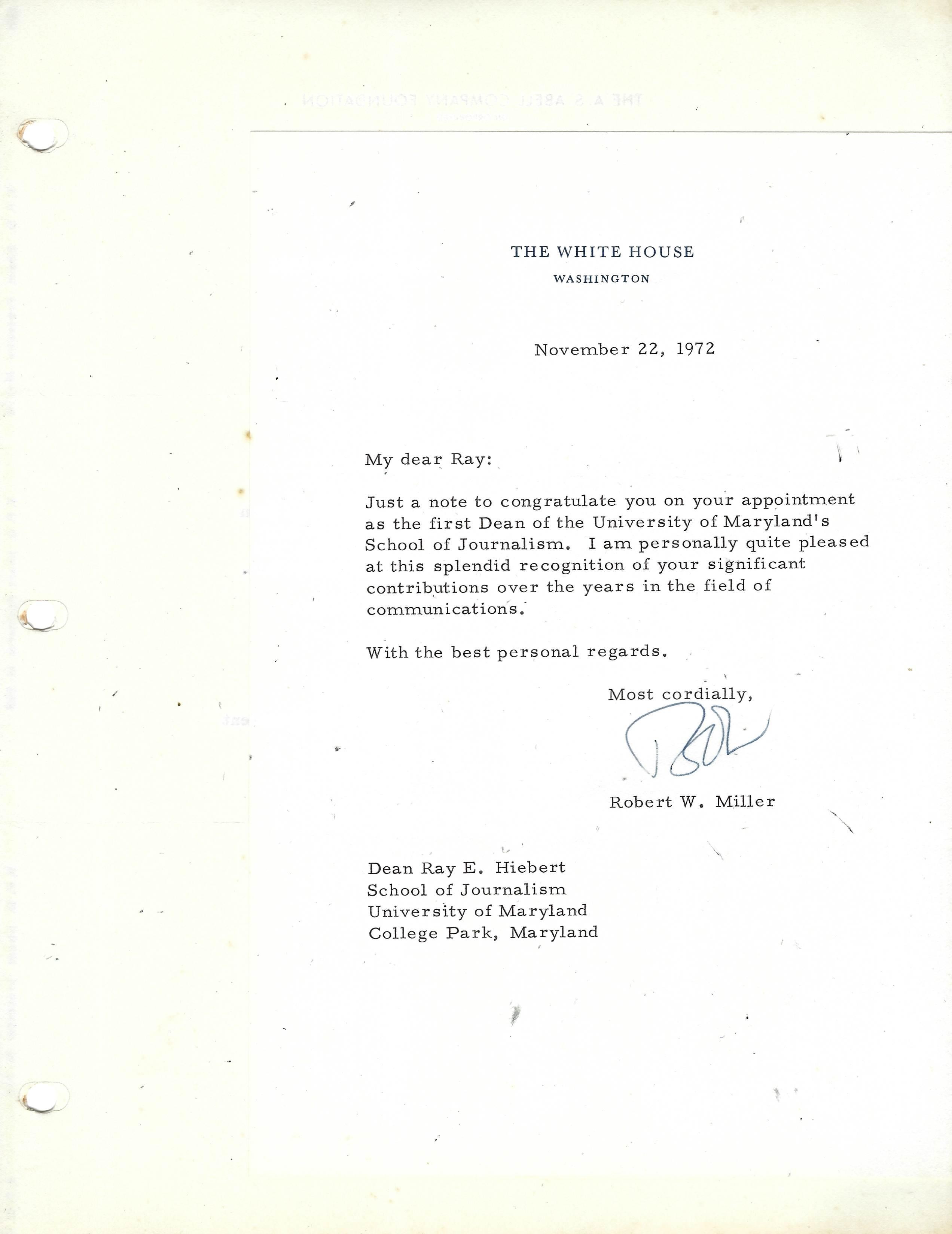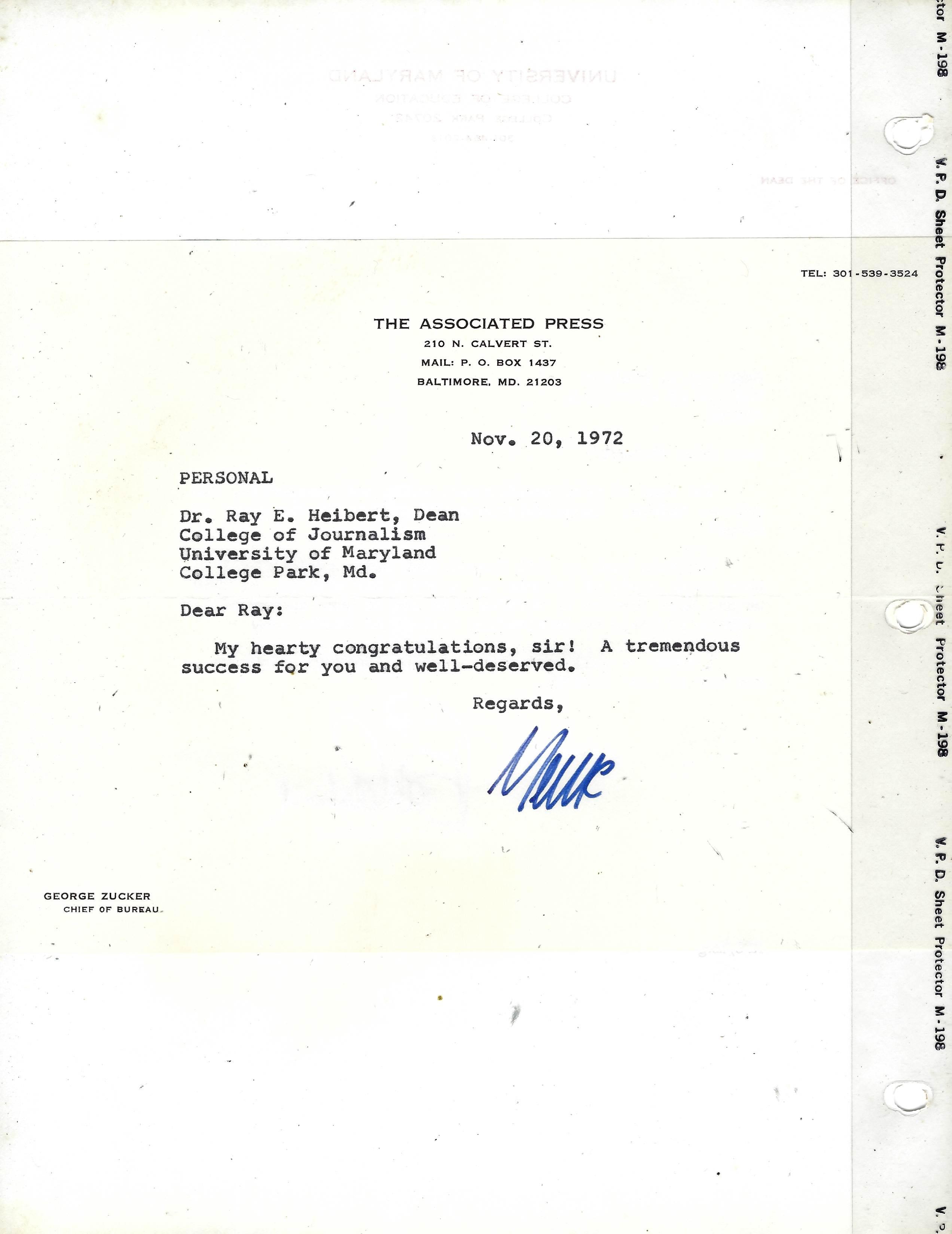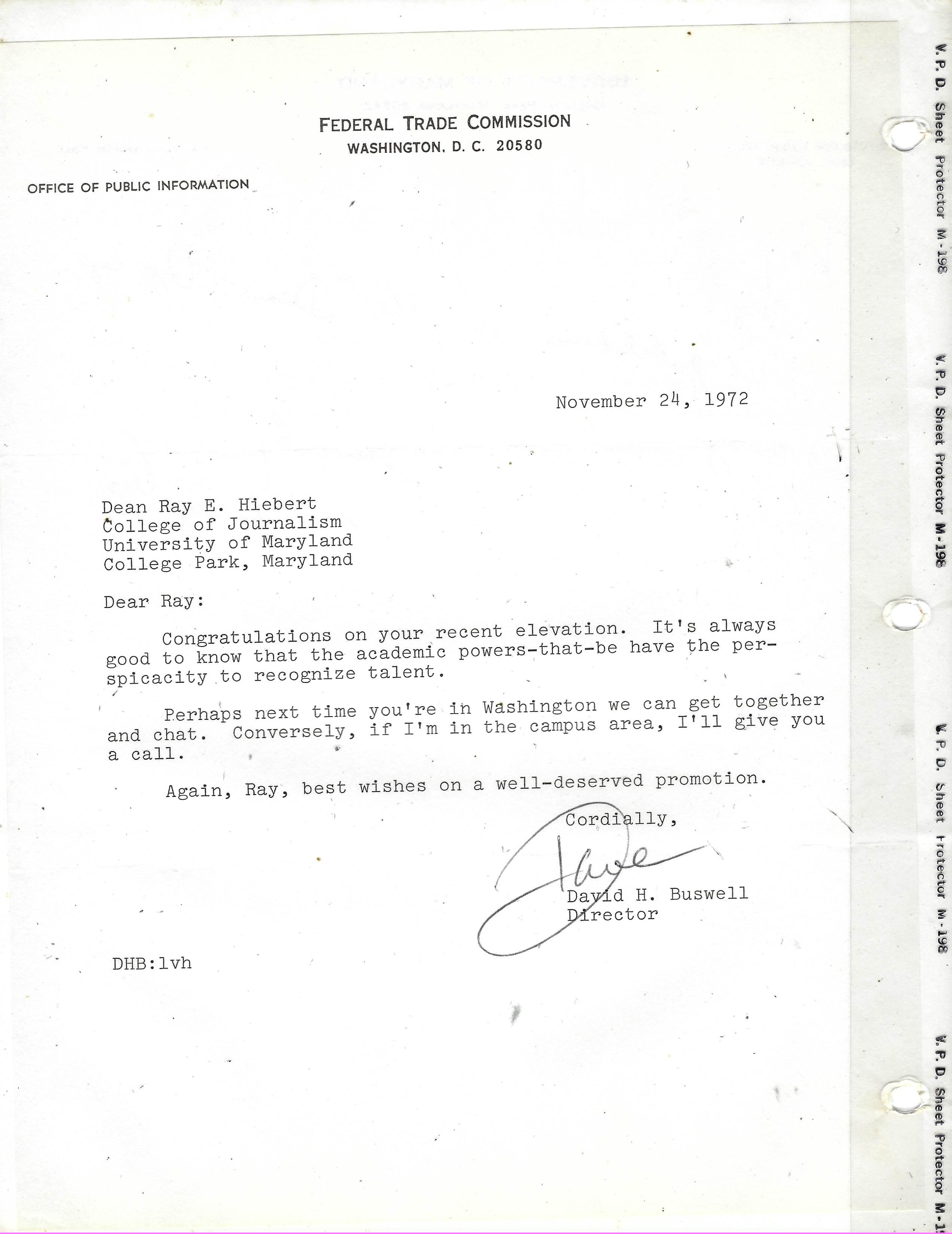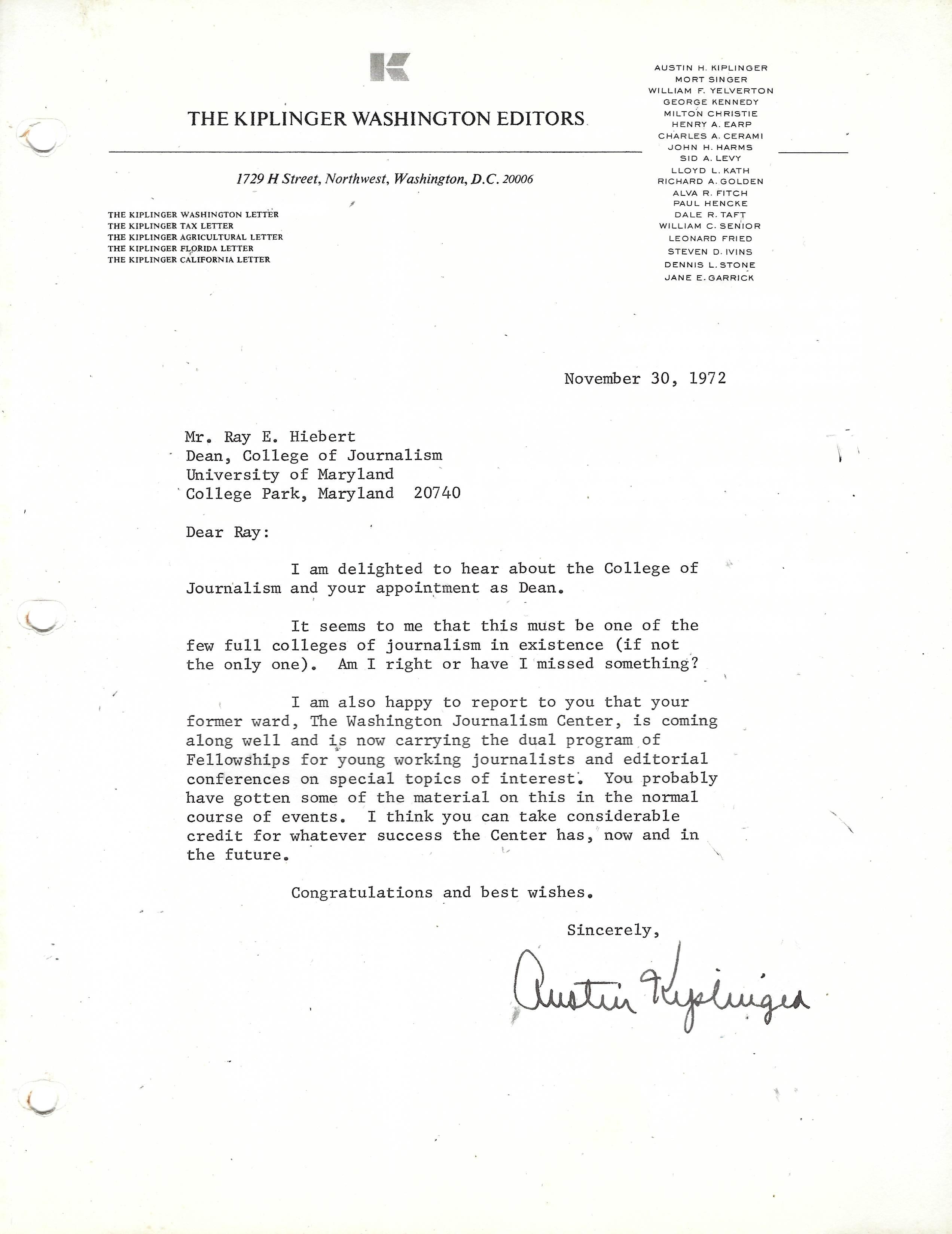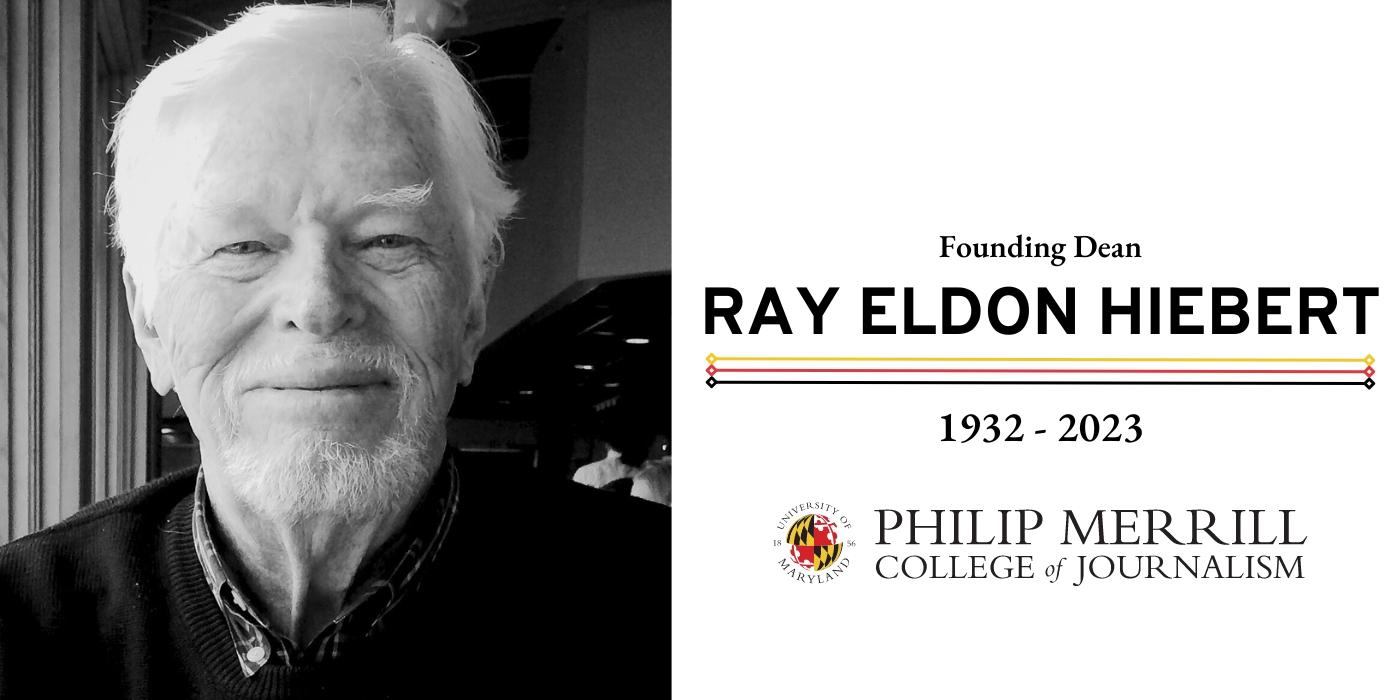
Dr. Ray Eldon Hiebert, founding dean of the University of Maryland’s Philip Merrill College of Journalism and an expert on international communication, died Aug. 5 in Carmel, California. He was 91.
The University of Maryland recruited him in 1968 to revamp its journalism department. Four years later, the program was elevated to college status and Hiebert became its first dean. In the following years as a professor, he concentrated on working with graduate students and served as chair or committee member of dozens of master’s theses and doctoral dissertations. He continued as dean until 1980. He remained on the faculty until his retirement in 1998 and taught another 10 years on a part-time basis. He was inducted into the Merrill College Hall of Fame in 2023.
"Ray was critical to getting Merrill College to where it is today, and he remained involved, interested and passionate about its mission throughout his life," Merrill College Dean Rafael Lorente said. "I remember Ray as someone who cared deeply about teaching and positioning graduate students to be the journalism educators of the future."
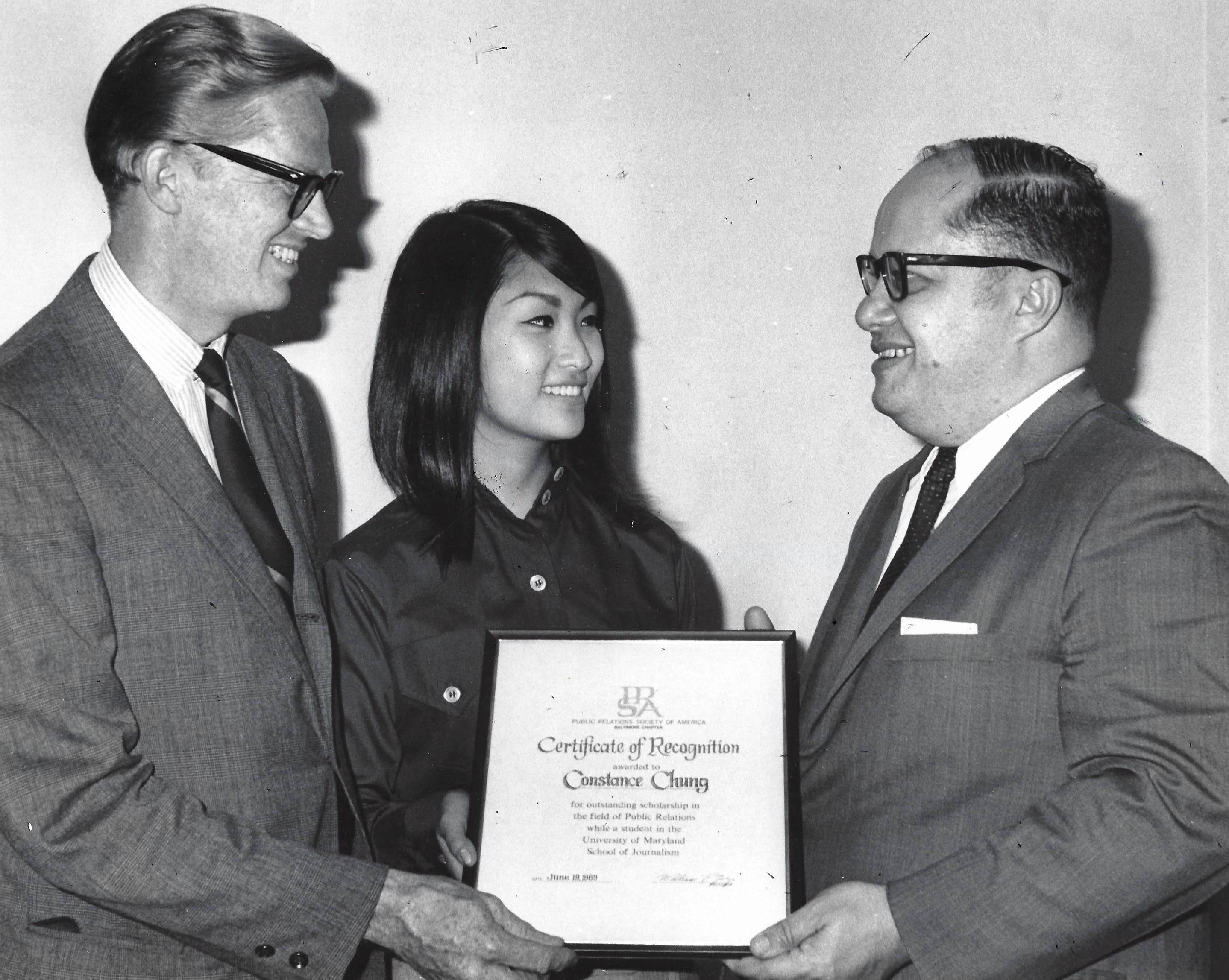
Born in Freeman, South Dakota, on May 21, 1932, he was brought to California as an infant by his parents, Peter Hiebert and Helen Kunkel, who made the long trip in a Chrysler sedan with Ray and five siblings (a sixth arrived a few years later). His father, a college professor, had lost his job because of the Dust Bowl. The family settled in Bakersfield, and later moved to Los Angeles, where Ray Hiebert went to high school. He was class president at Culter Academy (now Linfield Christian School), where he was editor of Culter’s literary magazine and lettered in four sports. Tennis became a lifelong love.
His career in journalism began with a paper route at age 10, delivering The Bakersfield Californian and the Los Angeles Times. It nearly ended on a nice Saturday when he attended a picnic and skipped his deliveries. Annoyed customers called the circulation manager and Hiebert was fired.
He again got a job delivering the Los Angeles Times that lasted until he went to college. He covered high school sports for the Los Angeles Examiner, gaining experience that later would pay off professionally. His sports editor at the Examiner, Ira Walsh, offered him a full-time sports reporting job when he graduated from high school. But on his parents’ advice, Hiebert turned down the offer to go to college, causing Walsh to give him a profanity-laced lecture on how a college education would ruin him as a journalist. Walsh later became head of the Hearst Foundation’s college journalism scholarship program and named Hiebert to the foundation’s board of advisors.
"I remember Ray as instrumental in keeping the College of Journalism on this campus at a time when there were proposals to move it to Baltimore County. He recognized the need to have a journalism program that allied itself with the world of Washington media. Ray, the founding dean of our college, always was forward looking."
In his freshman year of college, Hiebert was appointed co-editor of the newspaper at a small Midwestern college (Bethel College in Kansas) before spending his sophomore year at San Jose State University, then transferring to Stanford University on a scholarship. After graduating from Stanford, he was drafted into the U.S. Army in the waning days of the Korean War. His first encounter with Monterey County was in basic training at Fort Ord. Instead of heading to Korea, he was sent to France, where he served as editor of the Signal Corps newspaper. Being stationed in France enabled him to explore Europe and ignited his love of international travel.
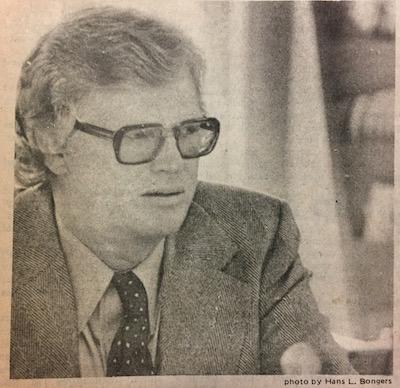 He worked at the Long Island Press while completing a master’s degree at Columbia University’s Graduate School of Journalism, and later at American Banker. He later earned two degrees in American Civilization from the University of Maryland College of Arts and Humanities, his M.A. in 1961 and his Ph.D. in 1962. He left full-time journalism on the recommendation of his Columbia dean, Edward Barrett, who felt he might have a greater impact on young journalists by teaching freedom of the press than by practicing it. At age 26, Hiebert was appointed assistant professor at American University in Washington, D.C., and was chairman of the department of journalism and broadcasting there by age 30, working part-time at NBC News. Hiebert was the first director of the Washington Journalism Center, the fellowship program founded in 1965 by publisher W.M. Kiplinger to bring midcareer journalists to Washington, D.C., for intensive seminars on crucial public issues of the day.
He worked at the Long Island Press while completing a master’s degree at Columbia University’s Graduate School of Journalism, and later at American Banker. He later earned two degrees in American Civilization from the University of Maryland College of Arts and Humanities, his M.A. in 1961 and his Ph.D. in 1962. He left full-time journalism on the recommendation of his Columbia dean, Edward Barrett, who felt he might have a greater impact on young journalists by teaching freedom of the press than by practicing it. At age 26, Hiebert was appointed assistant professor at American University in Washington, D.C., and was chairman of the department of journalism and broadcasting there by age 30, working part-time at NBC News. Hiebert was the first director of the Washington Journalism Center, the fellowship program founded in 1965 by publisher W.M. Kiplinger to bring midcareer journalists to Washington, D.C., for intensive seminars on crucial public issues of the day.
Eight years after joining the UMD journalism faculty, the U.S. State Department invited him in 1976 to give lectures on freedom of the press in 13 African countries. The experience changed his life, taking him around the world as a journalism lecturer and program director. He directed Voice of America’s summer journalism fellowship program for developing nations’ journalists and broadcasters, and conducted short courses in Africa and the Caribbean. He served as director of UMD’s American Journalism Center in Budapest for five years, offering short courses for journalists and university students on the techniques of objective journalism. He also worked with the University of Maryland to develop American-style journalism education in China. Hiebert was given the university’s Landmark Award for international service for his work in more than 50 countries.
Throughout his career, Hiebert continued to write and edit. He was author, co-author or editor of more than 25 books, including “Mass Media: An Introduction to Modern Communication,” one of the first textbooks to deal comprehensively with all media, and of “Courtier to the Crowd,” a biography of public relations pioneer Ivy Lee, who promoted transparency in organizational communication long before the idea was adopted widely. He was the founding editor of the Public Relations Review, one of the most widely read social science journals in the world.
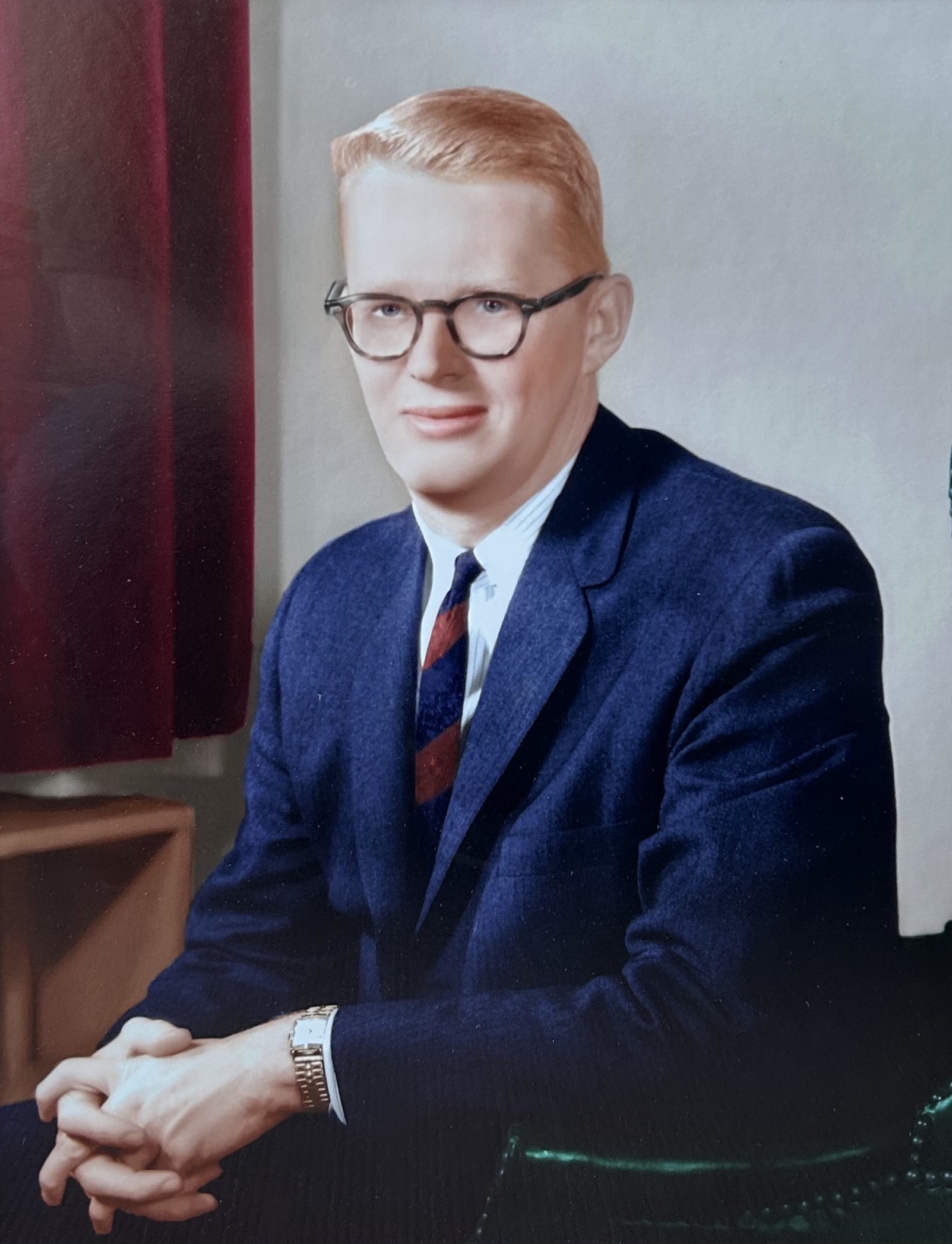 In retirement, Hiebert returned home to California from Maryland, settling in Carmel Valley in 2016. He loved the views of the Santa Lucias and Sierra de Salinas from his midvalley home, and thoroughly enjoyed the Central Coast’s stunning beauty and cultural riches, especially the Monterey Symphony, Bach Festival and chamber music ensembles. He was a member of the Cosmos Club in Washington, D.C., and St. Dunstan’s Episcopal Church in Carmel Valley.
In retirement, Hiebert returned home to California from Maryland, settling in Carmel Valley in 2016. He loved the views of the Santa Lucias and Sierra de Salinas from his midvalley home, and thoroughly enjoyed the Central Coast’s stunning beauty and cultural riches, especially the Monterey Symphony, Bach Festival and chamber music ensembles. He was a member of the Cosmos Club in Washington, D.C., and St. Dunstan’s Episcopal Church in Carmel Valley.
He is survived by the family he loved: his wife of 37 years, Sheila Gibbons Hiebert; four children from his marriage to Roselyn Hiebert: David, Steven (Christina Calkins) and Douglas (Kelly Meyer) Hiebert, and Emily (Kevin) Townsend; six grandchildren: Kyle (Sarah), Lindsay Ola Sun and Kelsey Townsend, and Laurel, Will and Sienna Hiebert (Nick Hlatky); two great-grandchildren: Oscar and Harper Townsend; a sister, Carol (John) Wiebe; and numerous nieces and nephews. He is fondly remembered by many students he encouraged over his 50-year career in education.
Hiebert never stopped believing in the transformative power of education and travel and funded programs in support of them, including the Ray Hiebert History of Journalism Awards at Merrill College. His family suggests that those who wish to remember him with a memorial gift consider a donation to the University of Maryland College Park Foundation, Inc., designated for the Hiebert Journalism International Travel Fund, 4603 Calvert Rd., College Park MD 20740 or online at go.umd.edu/HiebertFund.
Memories of Dr. Ray Hiebert
If you'd like to add a memory, please email it to joshland@umd.edu.
I remember Ray as instrumental in keeping the College of Journalism on this campus at a time when there were proposals to move it to Baltimore County. He recognized the need to have a journalism program that allied itself with the world of Washington media. Ray, the founding dean of our college, always was forward looking.
When I started teaching part-time at the college in 1974, it was apparent that Ray wanted to shift the focus from a small program that served Maryland to one that embraced a larger scope. He hired me full-time in 1975 to the consternation of older male faculty that looked in some horror at the employment of a woman! He always was supportive of my research into the history of women journalists while some saw that as a frivolous topic. He backed the first course in women and media on this campus and one of the very first in the nation. I believe I owe my career in the college, which lasted more than 30 years in large measure to him. He looked to the future, not the past.
Ray was certainly a fine teacher and scholar and administrator. But I can't help remembering something else special: that big smile. Ray always seemed in a good mood and always had a hearty, smiling greeting for everyone. Maybe that's a small thing, but it had a great impact on many of us.
Ray stayed engaged with Merrill College into his 90s. He stopped by my office during my first month as dean to introduce himself and offer assistance. We met periodically over the past 11 years and, more than anyone, he guided me (a nonscholar) on the importance of a vibrant research portfolio for Merrill College. I will miss him.
I sadly did not know Ray Heibert, but I of course heard his name through my parents. While the college eventually had our name on it, it is his vision and now his legacy that it is steered by. What a footprint on education and journalism he has left behind. May peace be with his family.
I first got to know Ray when I joined the faculty in the fall of 2001 and also started to pursue a Ph.D. He was always supportive, and delivered words of encouragement with his signature broad smile. After he retired, Lucy Dalglish asked me to reach out to him in April 2015 about his interest in endowing a fund to support research in journalism history at Merrill College. He invited me to drive down to St. Mary's County to spend the day with him at his light-filled home overlooking the Potomac River, not far from where it empties into the Chesapeake Bay. He took me to one of his favorite lunch spots, and as we chatted, I suggested some options that might serve his interests. We settled on the creation of a fund that would provide an annual award to a faculty member or graduate student for published research in journalism history. That was launched the following year, and Ray was always delighted to hear about the winners and read their work. He was also game to add a second award a few years later for the best student conference paper on journalism history.
I corresponded with Ray frequently. He knew that I was working on a book of journalism history that expands on my own 2010 Ph.D. dissertation on the history of election-night forecasting, and he always offered words of encouragement that meant a great deal to me. I'm only sorry that he will not get to see it published in the spring of 2024.
The deanship in those days was a job unto itself, particularly as we were transitioning from an undergraduate-only department within the UMD College of Business and Public Administration to becoming our own independent College of Journalism (later, Merrill College). So, Ray could have gotten away with just sitting in his office and running things. Certainly, there was a lot to do. But know this about Ray: He wasn’t content to be just an administrator. He was, first and foremost, a teacher and a mentor.
In the last semester of my junior year, in the Spring of 1971, I took Ray’s course in governmental public affairs. He gave us an assignment that taught me a reporting lesson I never forgot: stay with the story.
Our humble assignment was to find two government PR shops — they could be any place, anywhere — and then arrange to visit them in person (no phoners) and write up a report on what we learned. I decided I would compare and contrast the PR operations of two embassies — West Germany, and Great Britain. I was genuinely curious about each.
Good reporter that I aspired to be, I phoned each embassy and asked to speak to the press attaché. Each man (it was always a man, then) came on the line, heard me out and set up an interview. The Germans were efficient; they set up a meeting for me right away and obliged with a helpful interview.
The Brits were less interested in helping this undergrad, but the attaché eventually agreed and gave me a slot for a Friday afternoon in early May — perilously close to the deadline Prof. Hiebert had set. But still, I had time as long as that didn’t slip.
I showed up at the British Embassy on the day in question and announced my appointment with the attaché. I wasn’t on the visitor list; the attaché wasn’t in; and there was no one else in the press office that afternoon. Dejected, I walked back to my car, deeply worried about a deadline that was about to be blown. Then I noticed a small sign, pointing in the direction of a building up the hill: “Embassy of Denmark.”
I drove up the hill, parked my 1966 Corvair, walked in and asked for the press attaché. He turned out to have been in the job since before World War II (then a quarter-century in the rear-view mirror), and regaled me with fascinating stories not just of the present but of what it was like to be a press officer during the Nazis' reign, as Denmark struggled to maintain some semblance of neutrality after its occupation by Germany.
So, I had my story after all. And, a good one at that.
The last week of class, Ray walked in with a big pile of everyone’s reports. He had chosen a few that he wanted to discuss with the whole class (there were perhaps 20 of us). “John Jenkins,” he called out. “Come on up. This is fascinating work.”
Thirty-seven years later, I sat with Ray at the luncheon following the groundbreaking for Knight Hall. Ray’s brilliant thatch of red hair was grey now, but he was the same ebullient professor that I recalled from that long-ago day. I told him the story of Germany and Denmark. “No kidding?” he said. “I gave the class that assignment? Wow, that must have been something for you all.”
He turned to his wonderful wife, Sheila. “Hey, Sheila, you’ve got to hear this! John, tell her what you just told me.”
And I told that story all over again.
Ray Hiebert was a giant in the history of the Merrill College, creating the early foundation upon which this great school was built. But what I remember most about Ray was how kind and welcoming he was to a very young faculty member when I arrived in 1990, and how I can honestly never remember Ray without a big smile that always lit up the room. My condolences to Ray’s family and Maryland colleagues.
Ray was a consummate listener, making him a talented teacher and wise mentor. He had wonderful experiences to draw on, with practical, down-to-earth lessons to relay to his students — even to me, in my role as associate dean. He was generous in his support, and wise in his advice. I was fortunate to have Ray as a colleague.
The Kiplinger family felt privileged to know Ray Hiebert — a towering figure in journalism education in the U.S. and around the globe — for almost 60 years. In the two years before he came to the University of Maryland in 1968 to ramp up its journalism department, a young Ray Hiebert (then only in his early 30s) had served with distinction as the first director of the new Washington Journalism Center, founded in 1965 by my grandfather, journalist/publisher W.M. Kiplinger (1891-1967). In that capacity, Ray recruited the center's first fellows of midcareer journalists and organized high-level seminars on crucial public policy issues, the core of the center's program. The strong foundation that he helped lay for WJC endured for the next 25 years, until it merged its seminar program in the early '90s into today's National Press Foundation.
At Maryland Ray built the journalism program — today's Philip Merrill College of Journalism — into one of America's preeminent j-schools. He became an expert in international journalism training, lending his talent to press workshops all over the world, from Hungary to Liberia, South Africa to Iran and China. With a doctorate in American history, he was a prolific author on many subjects, and a tireless champion of a free and professional press.
Ray Hiebert's remarkable career was an inspiration to all who knew him, and we salute him.
So sad that we have lost a pioneering journalism educator. Ray hired me as an adjunct in 1975 and that led to my becoming his assistant dean in 1977. He encouraged my career in higher education and was a strong proponent of providing resources for scholastic journalism and supported the establishment of the Maryland Scholastic Press Advisers Association in the college. He was a true mentor to journalists and public relations practitioners of all ages. What a legacy!
It is with profound sadness that we mourn the passing of Dr. Ray Eldon Hiebert. As his former student, I am deeply saddened and feel compelled to honor the remarkable man who profoundly impacted my life.
Dr. Hiebert's contributions to public relations scholarship and international communication are immeasurable. His dedication to the field and his pursuit of knowledge left an indelible mark on countless students, academics and professionals alike. With his visionary leadership, he played a pivotal role in establishing the prestigious Philip Merrill College of Journalism, shaping it into the esteemed institution it is today.
Beyond his professional achievements, Dr. Hiebert’s warmth and kindness endeared him to all who had the privilege of knowing him. As his student, I was fortunate to experience firsthand his genuine care and unwavering support. Throughout my academic journey, he served as a mentor, guiding and nurturing me with his wisdom and insight that I will forever treasure.
As we bid farewell to this exceptional individual, we can find solace knowing that his legacy will endure. Dr. Ray Eldon Hiebert's contributions to the field will continue to inspire future generations. His wisdom, kindness, and unwavering commitment to his students and the field will forever be etched in our hearts and minds.
To Dr. Hiebert, I express my deepest gratitude for the profound influence he had on my life and the lives of countless others. His memory will continue to guide me as I navigate my academic and professional endeavors, always striving to uphold the values he instilled in me. He will be greatly missed, but his legacy will live on, forever inspiring and shaping the future of journalism.
I was very sad to learn that Ray had passed away, but I want this remembrance to celebrate the life that he lived. Ray Hiebert touched so many of our lives as a journalist, educator, scholar, mentor and editor. Ray started Public Relations Review nearly 50 years ago. He supported multiple generations of young public relations scholars and formalised the study of the field. Not only was he a great advocate for public relations research but he was also a great advocate for women in the field. I appreciated his generosity, humour and wisdom. My thoughts are with Sheila and his family. We’ll all miss Ray but his legacy lives on.
I came to know Ray in his capacity as editor the Public Relations Review, a peer-reviewed academic journal of scholarly significance which he founded. I was already familiar with his still-standard biography of Ivy Lee, one of the emerging modern creators and deep thinkers of the rising new public relations industry.
I quickly came to treasure him as a friend and mentor. Ray Hiebert mentored many, helping to establish voices for several generations of scholars across the globe. His leadership helped mature the scholarship of a controversial modern profession. As much anything Ray valued was history. He was a leading historian of this new thing — an industry, a practice, a profession seeking its place in the towers of academic respectability.
Kind, warm and generous, as is Sheila Hiebert, his wife of many decades, Ray offered extraordinarily productive service to the institutions of academia and journalism, and he was early to establish a journal as a place that welcomed badly needed high-powered intellectual theorizing and critical thinking about the increasingly powerful and controversial practice and profession of public relations.
All of Ray's capaciousness of mind and service came to us from a seemingly boundless generosity and good will. He and Sheila were (and indeed, remain) dear friends of mine and of my wife, the author and journalist, Delia Cabe.
Ray Eldon Hiebert will be sorely missed and deeply grieved. He lived in a way we might well wish for ourselves and our loved one: his was a life well-lived.
Ray was simply special, as a a scholar, an editor, a mentor and a mensch.
He published my first academic articles in PR Review and kindly co-authored my 1981 book on U.S. government PR, "Informing the People." He helped advance my transition to the private sector, and kept me on the PR Review editorial board throughout his tenure. I suspect he would have gotten a kick out of my late life rebirth as a senior scholar in health communications at the CUNY Graduate School of Public Health and Health Policy. None of this could have happened without his guidance.
He even occasionally let me beat him at tennis.
However much time is left to me, I will remember him with fondness and respect.
I started as a freshman at Maryland in 1968, when the journalism department was part of the College of Business and Public Administration. I wanted to study public relations, and it was part of the journalism curriculum, so into the journalism department I went! Dr. Hiebert was one of my instructors, although he was so much more than an "instructor." In truth, he was a "partner" in our training, in our learning. I specifically remember turning in a writing assignment in his class, and I thought I had done a very good job on that particular piece of writing. It came back from Dr. Hiebert with a very low grade, and some not-at-all-subtle comments about the quality of what I had produced. After that, I resolved to work much harder on my writing skills. Dr. Hiebert's comments on that one piece of paper affected the rest of my career.
Years later, as the owner of public relations firms in Richmond, Virginia, and Budapest, Hungary, I was fortunate to be able to assist Dr. Hiebert and the American Journalism Center in the training of press spokespersons for the newly democratic governments in Hungary, Poland, and numerous other former Communist countries in Central and Eastern Europe. Dr. Hiebert was passionate about the things that are essential to democracy: truth, honesty, transparency ... and he drove home those ideals in every training session we provided.
It was an honor to be his student, and an honor to be a collaborator. Rest easy, Dr. Hiebert.
Rest in peace, Dean, warm and comfortable in the gratitude of those who knew you as a friend, a builder of an institution and, most of all, to be successful contributors in the noble print journalism and broadcast fields.
Ray was a terrific teacher, a valued member of my doctoral committee, and a sweetheart of a guy. It's clear from reading all the tributes that his was a life filled with family love, journalistic passion and tremendous achievement. Hugs and healing thoughts to Sheila.
Just received the news of the passing of Dr. Ray Hiebert. His leadership during my years at the University of Maryland inspired me to continue on my journey into newspaper and broadcast work, along with media relations, for the past 50 years in the sports industry.
I'm a 1971 graduate (B.S. in Journalism and English) and began my career with The Washington Post, then The Baltimore Evening Sun, where I covered the Orioles, Colts, Bullets and ACC football and basketball teams for 10 years. I left there to become a sports editor at the Philadelphia Journal, then switched over to Major League Baseball front office work in the 1980s with the Chicago Cubs. In the 1990s I handled public relations at Kemper Sports and Golin/Harris PR firms in the Chicago area before starting my own PR firm, Ibach & Associates in 1996. For the past 27 years, I have also been a national sportscaster on radio shows.
None of this would have happened without Dr. Hiebert and his guidance. I was at a very low point in my college career when I first met Dr. Hiebert, and through several personal chats with him he convinced me to hang in there with my studies and pursue my journalism goals. What a wonderful man, and his calm demeanor and positive advice were just what I needed. I would not be where I am today without those sessions chatting with Ray.
Maryland and our journalism community, as well as The Diamondback newspaper, were blessed with a great leader, and I am sure many others in our department experienced similar experiences with Dr. Hiebert. May he rest in peace.
Dr. Hiebert was instrumental in my receiving a William Randolph Hearst Scholarship while I was a Journalism undergrad. Will be forever grateful for that.
Professor Hiebert was my Ph.D advisor and mentor for life. I would not be who I am today if it was not for his guidance, example and generosity. I consider myself extremely lucky to have known him and his wife, Sheila. He changed my life in a most meaningful way.
I met him when I was still a master's student at IU. He was the first scholar and professor in the U.S. who made me feel honored to be a foreign student. He was genuinely interested in my experience and what I had to say, and that interest never faded, even long after I had graduated. Being Chinese (from Taiwan), I could never bring myself to call him Ray as he had repeatedly asked me to — even years after I had received my Ph.D. He suggested that I call him "Prof" as a compromise, reassuring me that calling him that was as respectful as calling him "Professor Hiebert." Prof had consistently remained an important presence in my life, and will forever be.
Prof! You have touched and changed my life, as you have so many people's lives. I am unable to express my gratitude in words. You will be sorely missed.
Dr. Hiebert was chair/dean when I was completing both my bachelor's and master's degrees in journalism at UMD. I was a graduate student shortly after Dr. Hiebert launched the master's program.
The college was terrific under his leadership, and I was very fortunate to go on to work at great papers, including The Washington Post and the Los Angeles Times, before going into academia myself.
One of the things I remember about him was his approachability. He cared about students as well as the quality of the education they received. Not included in the history of the college was a community newspaper started by faculty while Dr. Hiebert was dean. It was called the Citizen-Call, which gave College Park its own newspaper and gave students real-life journalism experience. Also, I greatly admired his involvement with the U.S. State Department program to teach freedom of the press to African journalists, a principle many African countries still struggle with.
Ray hired me straight out of my Iowa Ph.D. program. He became a good friend and effective leader as the department head. He also was a frequent chess partner evenings in my apartment, and I came to know him well. He was a man of great depth, and that was proven when he became the first dean of the new College of Journalism. His leadership made possible the Ph.D. program in journalism, and he mentored many new professors as the program developed. He included me when he was invited to the Pentagon to teach public relations skills. He also brought me along as a co-instructor in a Tanzania short course for beginning journalists. (We played chess there, too.)
I was honored to nominate Ray to the Merrill College Hall of Fame, and I remain personally and professionally greatly indebted to Ray. I lament his passing. Good friends and good chess partners are hard to find.
Ray Heibert was my first professor as a Ph.D. student at Merrill. He was responsible for my career path in higher education and for my pursuit of media and news literacy as a lifelong passion. He took me under his wing in Fall 2003 to be part of a directed study around journalism education, and it was then I realized just how generous, kind and available Ray was. From countless hours meeting to talk about work and journalism, to lunches he organized around College Park, at his homes in Washington, D.C., and near the Chesapeake Bay, he was a larger than life presence at Merrill for many of us.
He was the reason I excelled in my doctoral program, and found the passion that I did. I've modeled my work at Emerson College around Ray's leadership, and have held him close to my heart over this time.
Good journalists play a vital role in keeping democracy in good health. One could say they are doctors with stethoscopes on society. Those who nurture the formation of the journalists of the future through instilling professional objectivity in their craft play an even deeper role. Then, there is a third category. The very few who envision, see to fruition and oversee institutions in which those who see with clarity and communicate with integrity are formed. Ray Hiebert was one of those few.
There is a sadness in the passing of one who has touched and shaped the lives of so many around the world. It is good and right to be present with that sense of loss. We can also take solace that what Dr. Hiebert represented, lives on in in his family, his friends, and in the lives of those he was instrumental in forming and launching into their journalistic professions. And I make no apologies in saying to this erudite readership that the encouraging, warm smile of which Ray Heibert’s colleagues have fondly spoken is smiling upon us in a mystery that is not bound by this life or the limits of our understanding.
The courage of truth-telling with integrity coupled with a spirit of encouraging kindness are vital to preventing our species from descending into deceptive self-serving caverns of destruction. The task is to shine a light so others can have sight whether it be the myriad interdependent lifeforms in the last vestiges of virgin prairie or the complex structure of community of an inner city neighborhood … with humility, knowing we can only fathom a mere fraction.
I pray that good journalism finds a way in this digital age and isn’t whittled down by trumped-up gas lighting or swallowed by simulations devoid of humanity. That’s a tall order, but the legacy and inspiration of Dr. Hiebert will help us find that path forward. Thank you Ray Hiebert for being a beacon of truth-telling with integrity and kindness so needed from the smallest hamlet to the halls of international power.
Forty years ago, I met Professor Hiebert at Voice of America in Washington, D.C. He was the program director of a training program for international students pursuing their studies in media and mass communication in various U.S. universities. I was one of the trainees.
Professor Hiebert was very nice, modest, kind and very helpful. He invited the trainees to his house on the Potomac. We met his lovely wife, Sheila. We had great food and memorable moments. In the late '80s, I invited Professor Hiebert through the U.S. Embassy to give lectures in various Algerian universities. Hiebert and I participated in an Algerian TV program about media industry and international news. I got a chance to show him the cities of Algiers, Jijel, Constantine, Batna, Biskra, Ghardaia, and Blida.
In 2004, Professor Hiebert gave a keynote speech for the international conference about public relations organized by the University of Sharjah. He devoted a special issue of Public Relations Review to public relations in the Arab world. Faculty members at Algiers University and the University of Sharjah still have great memories and respect of a great scholar and expert in mass communication and public relations.
Ray Hiebert never let you down mainly when you ask for his expertise and knowledge. I maintained with him and his wife Sheila during 40 years a great friendship and relations. A great man, cosmopolitan who loves to share his knowledge and expertise with students and researchers all over the world. Professor Hiebert, we will miss you and you will be remembered forever. Rest in peace and may god have you in his vast paradise. "To god we belong and to him we return."
Ray Eldon Hiebert: A mentor of a kind.
Your Algerian student and friend.
Dr. Ray Hiebert Historical Archive and Clips
